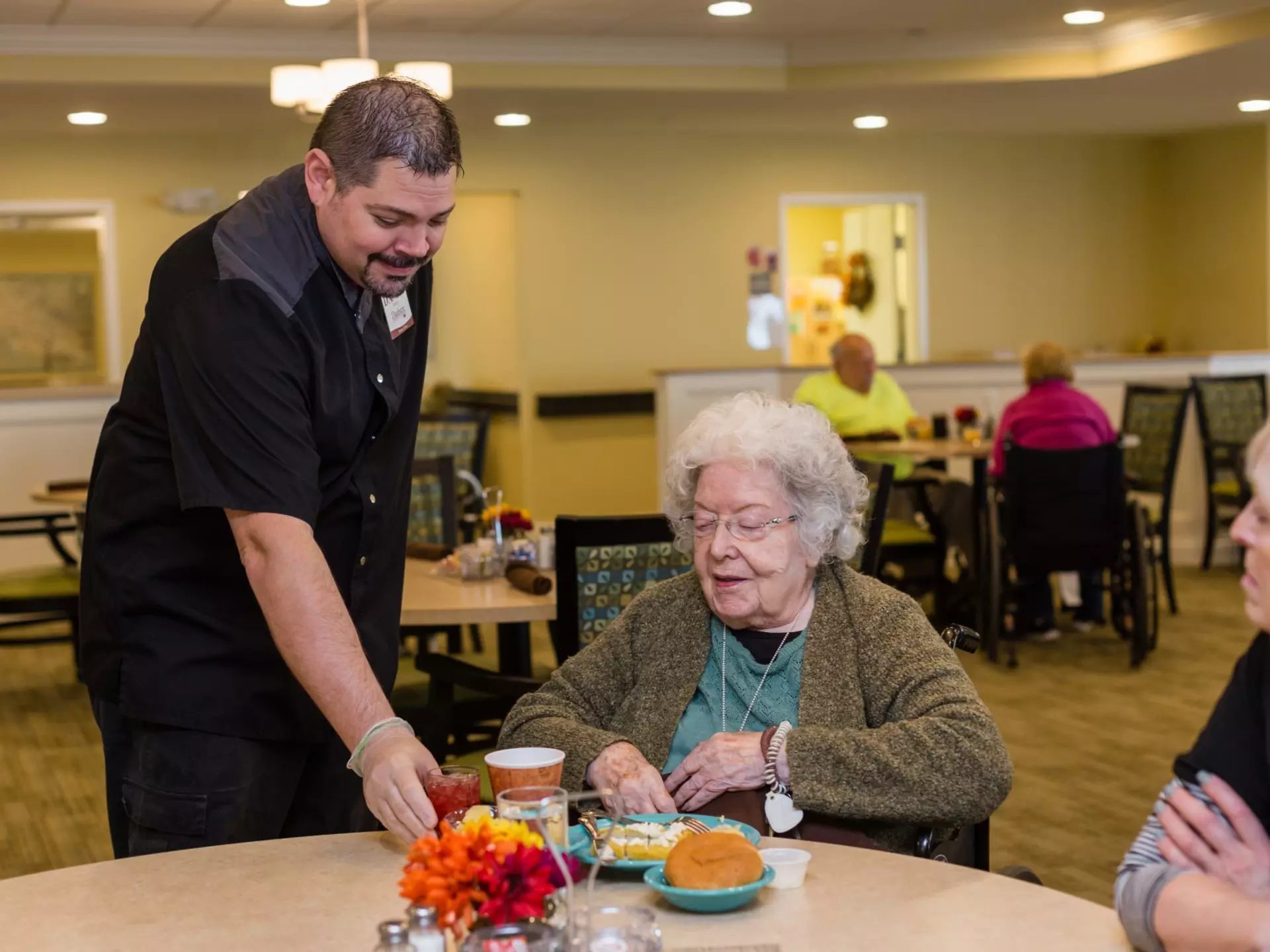When a family member is diagnosed with a memory condition like dementia, it can feel like your world is turning upside down. You might find yourself worrying about their safety and well-being, as well as how you can continue to support them as their needs change. Perhaps you’re asking yourself if it’s time to consider outside help, or if you’re even ready to make such a big decision.
Fortunately, there are many support services available to help both you and your loved one through this challenging journey. Assisted living and memory care services are two options that can provide the support needed for someone with dementia, but how do you know which one is best for your aging parent?
In this blog, we’ll answer some of the most important questions about dementia and assisted living to help guide you through the decision-making process.

Understanding the Intersection of Dementia and Assisted Living
Assisted living communities are ideal for people who need help with activities of daily living (ADLs) but do not require significant medical care. In this living arrangement, employees are usually available 24/7 to provide services which may include help with personal hygiene, feeding, transferring, housekeeping, and more.
As you consider additional support for your loved one, you might ask if someone with dementia can live in assisted living? Yes, a person with dementia can live in assisted living. However, not all assisted living communities are equipped to handle the unique needs of someone with dementia. In most cases, it depends on the stage of dementia and the specific services the community provides.
For those in more advanced stages of dementia, a memory care community will likely be a more suitable option. These communities are specifically designed to provide a secure and comfortable environment, along with 24/7 supervision and stimulating activities to support individuals with memory challenges, including advanced dementia.
When Is It Time to Move a Parent With Dementia Into Assisted Living?
As dementia symptoms progress, many caregivers find themselves asking if it’s time for assisted living? Deciding when to move a parent with dementia into assisted living is never easy.
Many families wish to care for their loved ones at home for as long as possible. However, as dementia progresses, it can become challenging to support your parent’s needs at home alone.
While every person’s journey is unique, there are some key signs that may indicate when to move to assisted living, such as:
- Increased Safety Concerns: Some signs of dementia, like increased confusion and memory loss, may make it challenging or unsafe for individuals with dementia to live alone. Assisted living communities provide a safe and comfortable environment with 24/7 access to trained caregivers who can step in when needed.
- Difficulty With Activities of Daily Living: When dementia makes it harder for your parent to handle activities of daily living (ADLs) like bathing, dressing, eating, or using the bathroom, it might be time to consider seeking out additional assistance. Assisted living services can provide your loved one with the right support while allowing them to live as independently as they wish.
- Declining Health or Mobility: If someone you love is living with dementia as well as other health conditions or mobility challenges, their needs may become too much to manage safely at home. Many assisted living communities can provide both medical care and assistance with transferring to help improve their quality of life.
- Caregiver Stress and Burnout: As dementia progresses, supporting someone with dementia can quickly feel like a full-time responsibility. If you’re struggling to meet your parent’s needs or need a break from the demands of caregiving, assisted living is worth considering.
- Social Isolation: Some symptoms of dementia can make it difficult for individuals to interact with others, often leading to feelings of loneliness and isolation. Assisted living offers engaging group activities, social events, and lots of opportunities for companionship, which can help improve your loved one’s quality of life.

What to Look for in an Assisted Living Community for Loved Ones With Dementia
When searching for the right assisted living community for a family member with dementia, it’s natural to feel both hopeful and overwhelmed. Since not all assisted living communities are the same, it’s important to know what to look for. In fact, many assisted living communities offer dedicated memory care neighborhoods, which will be the right option for many seniors with memory challenges.
Here are some key things to keep in mind during your search:
- Specialized Memory Care Programs: Look for communities that also offer dedicated memory care neighborhoods. These programs are specifically designed to meet the unique needs of people with dementia.
- Trained Employees: Caregivers and nurses in memory care communities should have specialized training in dementia care, including how to communicate effectively and respond to different behaviors with patience and understanding. This expertise can make a meaningful difference in your loved one’s comfort and well-being.
- Safety Features: Safety is essential when supporting someone with dementia. Look for communities that provide features like enclosed outdoor spaces, monitoring systems, and secure entrances and exits to help keep residents safe.
- Personalized Care Plans: Every person with dementia is unique. The best communities create individualized care plans tailored to your loved one’s specific medical needs, physical health, and emotional well-being.
- Engaging Activities: Activities including music therapy, art projects, or puzzles can be especially beneficial for individuals with dementia. For this reason, it’s helpful to look for communities that provide structured, engaging programs to keep residents active and connected.
- Supportive Dining Services: Some individuals with dementia may find it challenging to eat comfortably on their own. Communities that offer features like ergonomic utensils, easy-to-hold meal options, and consistent mealtime routines can make dining more enjoyable and less stressful for your loved one.
- Health Care Access: If your parent has other medical conditions that require ongoing health care, it may be wise to prioritize communities that offer on-site medical support and transportation to doctors’ appointments.
How to Move a Parent With Dementia to Assisted Living
Moving a parent with dementia to assisted living is one of the hardest steps many families face. Here are practical tips that can help make this process go more smoothly for both you and your loved one:
- Have the Conversation Early: Starting the conversation about assisted living can be emotionally challenging for many adult children. It’s normal to experience pushback, particularly when your parent feels that additional help means taking away their independence. Choose a calm, quiet time to hold the conversation. Ideally, the location should be a familiar place where your loved one feels safe. Gently reassure them that the move is for their well-being.
- Involving Family and Medical Professionals: You don’t have to make this decision alone. Involving family members can help share the responsibility and ensure everyone’s concerns are heard. Your loved one’s doctor or physician can also help provide additional guidance about health needs and what kind of community might be the best fit.
- Tips for a Smooth Transition on Moving Day: When moving day arrives, choose a time of day when your parent is calm and rested. It may help to bring along familiar items like their favorite photos, blankets, or personal decorations to make their new space feel like home.
- After the Move: It’s normal to feel a mix of guilt, sadness, and even relief after the move. These emotions are part of the caregiving experience. Remind yourself that choosing assisted living doesn’t mean you’ve failed; it means you’re making sure your loved one has the support they need. You can remain involved by visiting them as often as you can and keeping in touch through text, voice calls, or video calls.

Alternatives If Assisted Living Isn’t the Right Fit
Sometimes, assisted living isn’t the best choice for a loved one with dementia. Every person’s journey with dementia is different, and it’s crucial to find the type of support that best fits your family member’s specific needs.
Here are some key alternatives to consider:
- In-Home Care: In this arrangement, professional caregivers can visit as needed to provide companionship and assist with activities of daily living (ADLs), like bathing, eating, and getting dressed. This option may work well for individuals who wish to receive support in the familiar comfort of home, surrounded by the love and warmth of close family. It’s important to keep in mind, however, that as your parent’s needs progress, they may eventually require a higher level of support, particularly memory care.
- Memory Care: Memory care communities are designed specifically for people with memory challenges like Alzheimer’s and dementia. These communities often feature secure neighborhoods with large windows, enclosed outdoor spaces, and trained employees who understand how to meet the unique needs of people living with memory conditions.
- Skilled Nursing: Skilled nursing communities typically provide round-the-clock medical care along with assistance with activities of daily living (ADLs). This option is usually best for individuals living with health conditions that may require frequent hospital visits, including advanced diabetes, heart disease, or complications from Parkinson’s disease. In these cases, skilled nursing can provide the higher level of medical supervision that assisted living and even memory care may not be able to offer.
StoryPoint Group Communities: Here for You and Your Loved One
At StoryPoint Group communities, we value every resident like family. We understand that each person’s journey is unique, which is why we take the time to get to know their specific needs — so that we can provide the best possible experience for them.
If someone you love could benefit from additional support services, including assisted living and memory care, we’re here to help guide you every step of the way.
To learn more about our communities, or say hello, give us a call at 1-844-275-9990 or schedule a tour at your nearby StoryPoint Group community.












